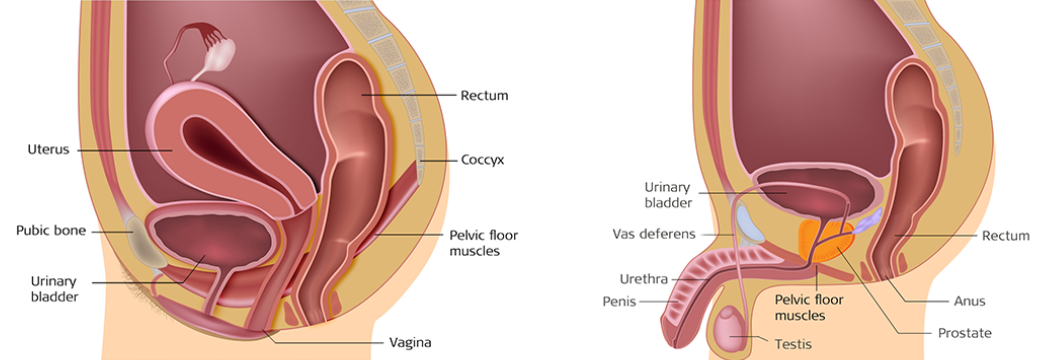PELVIC FLOOR PHYSIOTHERAPY
Incontinence and pelvic pain don’t have to be the new norm. Talk to our pelvic floor physiotherapist about treatment.
WHAT IS PELVIC FLOOR PHYSIOTHERAPY?
Pelvic floor physiotherapy or pelvic physiotherapy, as it is also known, involves the assessment and treatment of various conditions that affect the pelvic floor.
This involves a holistic approach by discussing lifestyle and assessing movement to treat conditions such as pain, prolapse, incontinence and more.
WHICH CONDITIONS DOES PELVIC PHYSIOTHERAPY TREAT?
Common conditions pelvic floor physiotherapy can address include:
- Stress and/or urge incontinence
- Fecal incontinence
- Post-partum pain
- Pudendal neuralgia
- Bladder pain syndrome
- Interstitial cystitis
- Organ prolapse
- Coccydynia
- Vulvodynia
- Dyspareunia
- General pelvic pain
- Low back pain
WHAT IS THE PELVIC FLOOR?
The pelvic floor includes a group of muscles, nerves, ligaments, and fascia located at the bottom of the pelvis. The pelvic floor muscles play 5 important roles in the body by providing support for many internal organs, including the bladder and uterus.
These muscles play a major role in bladder control and pelvic support. When these muscles are not functioning well, incontinence and pain can occur. When pelvic floor muscles are tight and/or weak, they can also place stress on the joints of your back and hips, causing low back and/or hip pain.
Pelvic floor dysfunction can be caused by either weak pelvic floor muscles (hypotonicity), or tight pelvic floor muscles (hypertonicity).
Weak Muscles (hypotonicity) can contribute to:
- Urinary incontinence or fecal incontinence
- Pelvic organ prolapse
- Chronic pelvic pain
- Sexual pain (dyspareunia)
- Pregnancy related pain
Tight Muscles (Hypertonicity) can contribute to:
- Urinary frequency, urgency, hesitancy, stopping and starting of the urine stream, painful urination, or incomplete emptying
- Constipation, straining, pain during or after bowel movements
- Unexplained pain in your low back, pelvic region, hips, genital area, or rectum
- Pain during or after intercourse, orgasm, or sexual stimulation
- Uncoordinated muscle contractions causing the pelvic floor muscles to spasm
HOW IS THE PELVIC FLOOR EXAMINED?
Pelvic floor physiotherapy involves both internal and external examinations, completed by a trained pelvic physiotherapist, to provide a thorough assessment of the joints and tissues affecting the pelvic floor.
An external examination is helpful to assess posture, movement patterns, as well as strength and flexibility of external muscles. Although recommendations and treatment can often be initiated with an external examination, internal assessment is often suggested.
An internal examination is often recommended in order to accurately assess the structures of the pelvic floor, assess one’s ability to contract and relax internal muscles, and identify the affected tissues.
Internal muscle function, muscle tightness, strength and endurance, cannot be properly assessed and/or treated from an external examination only.
WHERE IS PELVIC PHYSIOTHERAPY OFFERED?
Currently, pelvic floor physiotherapy is being offered in-person out of all three of our clinic locations. In addition, pelvic health services are offered through our mobile clinic that services Peterborough and surrounding areas. After an initial assessment from one of our pelvic floor physiotherapists, pelvic floor physiotherapy can be offered virtually from anywhere.
DO I NEED A DOCTOR'S NOTE FOR PELVIC FLOOR PHYSIOTHERAPY?
Pelvic floor physiotherapists are registered physiotherapists with additional training and experience in treating pelvic health conditions. Registered physiotherapists are regulated health professionals and therefore you do not need a doctor’s note or referral to see one.
We do encourage open communication with your doctor(s) and you can let us know at your first visit if you would like them to be included in your correspondence. Please note that some extended health care plans require a physician’s note to have pelvic floor physiotherapy expenses reimbursed.
HOW LONG IS A PELVIC FLOOR PHYSIOTHERAPY APPOINTMENT?
Depending on the nature of your injury or condition the assessment could range from 30 minutes to 1 hour in length. This will be discussed prior to your assessment. The number and length of follow-up visits can also vary and will be discussed once your initial assessment is completed.
WHAT HAPPENS AT THE FIRST PHYSIOTHERAPY APPOINTMENT?
At the first pelvic floor physiotherapy appointment, your physiotherapist will take a full history and perform various tests and assessments to determine the clinical diagnosis of your injury or condition.
If treatment is required it will also be provided during the first visit. Once the assessment is completed you and your physiotherapist will create a program that is tailored to your specific needs and goals. This will be discussed in detail with you during your initial visit.
DOES INSURANCE COVER PELVIC FLOOR PHYSIOTHERAPY?
Your physiotherapy visits may be covered under an employment plan that you or a spouse has. You will be encouraged to check the details of that plan and submit your receipts for reimbursement.
OHIP (government-funded) coverage for physiotherapy services is only available at OHIP-licensed facilities for Ontario residents under the age of 18 or over 65. Propel Physiotherapy is not an OHIP-licensed facility.
We provide treatment for all Motor Vehicle Accident and WSIB cases.
CAN I GET PHYSIOTHERAPY TREATMENT AT HOME?
Yes, our pelvic floor physiotherapists can provide treatment in the home. Please note there is a travel fee.
CAN PELVIC FLOOR PHYSIOTHERAPY TREATMENT BE DONE VIRTUALLY?
Although part of the session can be performed virtually, such as history taking and providing education, to achieve maximum benefits a full in person session is required. This will allow the therapist to properly assess and treat the pelvic floor muscles.
WHAT KIND OF PHYSIOTHERAPY TREATMENT WILL I HAVE?
The initial hands-on assessment typically includes an internal and external examination. Based on the results, a personalized treatment plan will typically consist of exercises and education.
WHAT DO I BRING TO THE FIRST PHYSIOTHERAPY APPOINTMENT?
Some appointments will require you to exercise and move around. Please bring light, loose-fitting clothes that allow you to move comfortably. Remember to bring a water bottle if you have one.
Also bring any relevant medical information you have access to – doctor’s prescriptions, reports, imaging results. If you have extended health benefits it is a good idea to bring your coverage information or booklet.
OUR LOCATIONS
CLINIC LOCATION
1 Eva Rd., Suite 107
Etobicoke, ON, M9C 4Z5
1-866-210-6303
CLINIC HOURS
Monday 8:00 – 7:00
Tuesday 8:00 – 7:00
Wednesday 8:00 – 7:00
Thursday 8:00 – 7:00
Friday 8:00 – 7:00
Saturday 8:00 – 12:30
Sunday CLOSED
visit the Propel Physiotherapy Etobicoke location page for more info
CLINIC LOCATION
1099 Kingston Rd., Suite 5A
Pickering, ON, L1V 1B5
1-866-210-6303
CLINIC HOURS
Monday 8:30 – 7:00
Tuesday 8:30 – 7:00
Wednesday 9:00 – 6:00
Thursday 8:30 – 7:00
Friday 8:30 – 7:00
Saturday 8:00 – 12:30
Sunday CLOSED
visit the Propel Physiotherapy Pickering location page for more info
CLINIC LOCATION
1600 Lansdowne St. W., Unit 9,
Peterborough, Ontario, K9J 7C7
mobile services for Peterborough & surrounding areas
1-866-210-6303
CLINIC HOURS
Monday 8:00 – 7:00
Tuesday 8:00 – 7:00
Wednesday 8:00 – 7:00
Thursday 8:00 – 7:00
Friday 8:00 – 7:00
Saturday 9:00 – 1:00
Sunday CLOSED
visit the Propel Physiotherapy Peterborough location page for more info

PELVIC FLOOR RESOURCES
QUESTIONS ABOUT PELVIC PHYSIOTHERAPY?
Extremely knowledgeable and professional staff. Talia put me right at ease and helped me to recover from my postpartum pain and childbirth injuries. Pelvic floor physiotherapy should be a standard part of maternal healthcare, and Propel Physiotherapy is the best. I highly recommend them.
– Nikki G.
Propel is just what you want in a health care clinic; such an inviting atmosphere with kind, knowledgeable staff who are eager to help you in every way to meet your goals. Highly recommend this place!
– Christine D.





